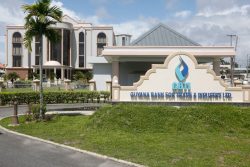Guyana and Suriname are not adequately exploiting trade and other economic opportunities either between themselves, or with Brazil.
A ‘strategy report’ on enhancing export trade between Guyana/Suriname and Brazil undertaken by the European Union-funded Caribbean Export said Guyana and Suriname are taking far less than full advantage of trade opportunities either between themselves, or with Brazil.
Stabroek Business has seen a copy of the March 2014 report prepared for Caribbean Export by Business Strategist Lincoln Price which asserted that the failure of the two mainland Caribbean Community (Caricom) territories to make the best of their proximity to one of the world’s economic powerhouses has occurred despite the existence of longstanding agreements designed to enhance trade between them and Brazil.
which asserted that the failure of the two mainland Caribbean Community (Caricom) territories to make the best of their proximity to one of the world’s economic powerhouses has occurred despite the existence of longstanding agreements designed to enhance trade between them and Brazil.
“The Partial Scope Agreements (PSAs) between Brazil and both Caricom members are not having the desired impact for a number of reasons,” the report said, adding that these agreements “do not cover most of Guyana and Suriname’s most competitive products.”
The report stated that the elements of the PSA, which cover trade regulations, and the operation of the Administrative Committee (AC), “appear to have remained untested by the end users” and a number of “major infrastructural deficiencies still remain in areas including energy cost and availability and road infrastructure.”
The study cited “project challenges” and other shortcomings that include market coordination constraints. In this regard it said that on occasion it was “difficult to engage strategic partners based on arrangements which crowded out this effort.
The report also cited “private sector apathy” pointing out that “most stakeholders had indicated that initiatives to boost trade ties with Brazil had been undertaken previously and that there was “little credibility” in those efforts.
It added that “persons were generally not supportive based on their past experiences with similar projects.
It was felt that there were already enough studies on Brazil but there was a general lack of public sector commitment to follow through on agreed tasks.
The study indicated that “private sector projects such as the GMSA-SEBRAE initiative were on the slow burner.”








